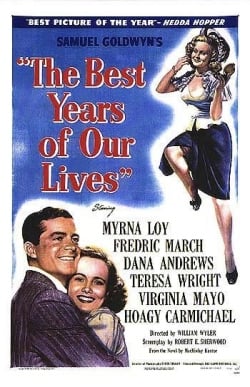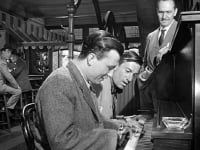Memorial Day Must-See: The Best Years Of Our Lives

I don't know about you guys, but come Memorial Day it's always World War II that springs to mind. It's probably because it's the only war that any of my close relatives fought in; three of my four grandparents saw action, one protecting the Panama Canal, one preparing to invade Japan in the Pacific Theater, and one, a nurse, tending to Patton's men in France.
Like many, many Americans, my life was completely shaped by this war. Both sets of grandparents met because of it. Two were on the same Army base in Spartanburg, South Carolina, and kept up a romance throughout the war. The others met at a train station when he was on two-week leave, and married before he had to ship back out.
Why am I spending Memorial Day giving you my family history and keeping you away from barbecue? Because I figured I ought to pick a wartime movie to write about today, and because I haven't seen nearly enough of them to merit a Top 5 list of any kind, I'm just going to write about one: The Best Years of Our Lives. It's the best war movie you've probably never seen if what you're looking for is gun battles and a blaze of glory. It's an incredibly precise human drama, a weepie that's also full of plenty of manly angst, and one of the best-looking films of the period. Yeah, you need to see it.
The movie opens after combat is through, with Al (Fredric March), Fred (Dana Andrews) and Homer (Harold Russell, in his first screen role) sharing a plane ride home after years on the World War II battlefields. Contrary to the stereotype of the soldier rushing home into the arms of his beloveds, none of them are really ready to return. Fred has left behind a party-girl wife and a father who has never been all that proud of him, and Homer has returned with hooks for hands after his were burned in an aircraft carrier explosion. Even Al, with a wife and kids who adore him, spends his first night home drinking at the bar with his newfound friends.
Well before anyone had coined the phrase "PTSD" or presented any conflicting feelings about war onscreen, The Best Years of Our Lives-- an ironic title, to be sure-- explored what it's like to have regrets about fighting for your country. But the movie isn't unpatriotic, making it better Memorial Day viewing than, say, The Deer Hunter. The hometown that the three soldiers return to is clearly worth fighting for, the kind of place where Hoagy Carmichael plays the piano at the local bar and the girl next door is played by the divinely gorgeous Teresa Wright. But the genius of the movie is showing that, when you've been dealing with shrapnel and tanks for four years, American flags and apple pie will be what seems alien.

Director William Wyler worked on the film with cinematographer Gregg Toland, who had already made his massive impact on cinema with Citizen Kane. This film, though missing some of the sweeping style of that movie, looks just as good, filmed in a crisp black and white with much of the deep focus staging that Kane is now revered for. In one scene Al and Homer play the piano together, while way at the back of the bar, Fred talks on the phone; the deep focus allows all three characters to work together, letting you create your impression of the scene rather than having it forced upon you. Another scene is way showier, featuring Fred's wife and Al's daughter (Wright, who becomes Fred's love interest) in a mirrored restaurant dressing room. The camera slowly pans around in his hall of mirrors in a long uninterrupted take, making the scene as remarkable for its visuals as for the fact that DP Toland managed to stay out of the frame.
Best Years of Our Lives works as both a look at an ambivalent post-war America and as a cinematic masterpiece, a fusion of content and style that feels way ahead of its time even today. When I think about my grandparents returning home for the war, all of them newly married, all of them about to have families, I can only wonder if they asked these same questions, felt the same fear about returning to civilian life. If I had asked them when they were alive, they probably wouldn't have copped to it; the accepted public story about World War II is one about valor and camaraderie and sacrifice, and dissenting views rarely get aired.
CINEMABLEND NEWSLETTER
Your Daily Blend of Entertainment News
But in 1946, one year after the end of the war, Wyler and his cast cannily worked within the studio system to make a movie that poked a hole in America's hot-air ideals, even if in the end the ideals of the small town are restored. Somewhere between the grandstanding courage of John Wayne war movies and the deep cynicism of the Vietnam era, there is this movie, proud to be an American but not without its qualms. As we now go through a period of national rebirth, all that hope and change, while still coping with so many mistakes and disasters, the sentiment of Best Years of Our Lives is probably a familiar one. If you get a chance, watch this movie today-- and it's OK if you get some barbecue first.
Staff Writer at CinemaBlend
Most Popular







